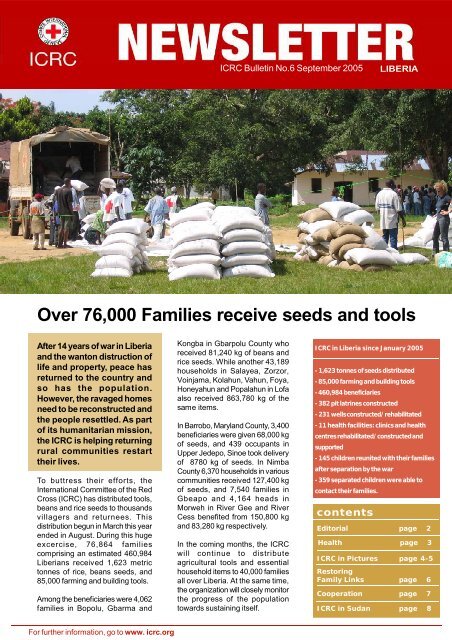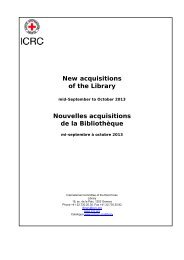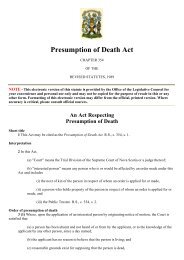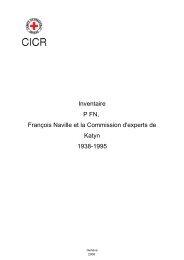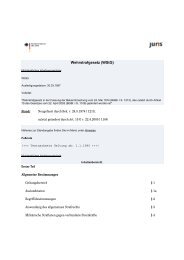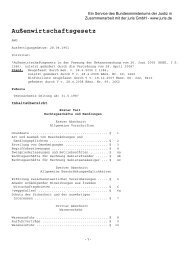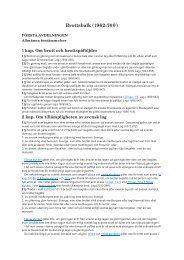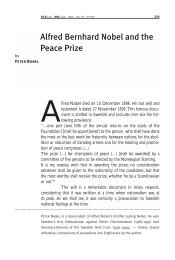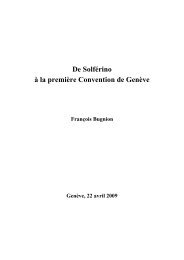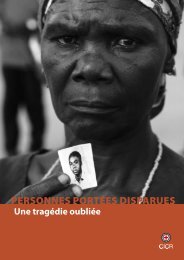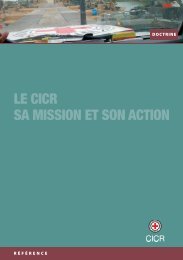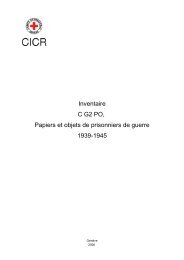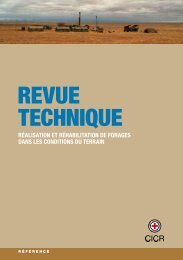ICRC Liberia newsletter - International Committee of the Red Cross
ICRC Liberia newsletter - International Committee of the Red Cross
ICRC Liberia newsletter - International Committee of the Red Cross
You also want an ePaper? Increase the reach of your titles
YUMPU automatically turns print PDFs into web optimized ePapers that Google loves.
Over 76,000 Families receive seeds and tools<br />
After 14 years <strong>of</strong> war in <strong>Liberia</strong><br />
and <strong>the</strong> wanton distruction <strong>of</strong><br />
life and property, peace has<br />
returned to <strong>the</strong> country and<br />
so has <strong>the</strong> population.<br />
However, <strong>the</strong> ravaged homes<br />
need to be reconstructed and<br />
<strong>the</strong> people resettled. As part<br />
<strong>of</strong> its humanitarian mission,<br />
<strong>the</strong> <strong>ICRC</strong> is helping returning<br />
rural communities restart<br />
<strong>the</strong>ir lives.<br />
To buttress <strong>the</strong>ir efforts, <strong>the</strong><br />
<strong>International</strong> <strong>Committee</strong> <strong>of</strong> <strong>the</strong> <strong>Red</strong><br />
<strong>Cross</strong> (<strong>ICRC</strong>) has distributed tools,<br />
beans and rice seeds to thousands<br />
villagers and returnees. This<br />
distribution begun in March this year<br />
ended in August. During this huge<br />
excercise, 76,864 families<br />
comprising an estimated 460,984<br />
<strong>Liberia</strong>ns received 1,623 metric<br />
tonnes <strong>of</strong> rice, beans seeds, and<br />
85,000 farming and building tools.<br />
Among <strong>the</strong> beneficiaries were 4,062<br />
families in Bopolu, Gbarma and<br />
For fur<strong>the</strong>r information, go to www. icrc.org<br />
<strong>ICRC</strong> Bulletin No.6 September 2005<br />
Kongba in Gbarpolu County who<br />
received 81,240 kg <strong>of</strong> beans and<br />
rice seeds. While ano<strong>the</strong>r 43,189<br />
households in Salayea, Zorzor,<br />
Voinjama, Kolahun, Vahun, Foya,<br />
Honeyahun and Popalahun in L<strong>of</strong>a<br />
also received 863,780 kg <strong>of</strong> <strong>the</strong><br />
same items.<br />
In Barrobo, Maryland County, 3,400<br />
beneficiaries were given 68,000 kg<br />
<strong>of</strong> seeds, and 439 occupants in<br />
Upper Jedepo, Sinoe took delivery<br />
<strong>of</strong> 8780 kg <strong>of</strong> seeds. In Nimba<br />
County 6,370 households in various<br />
communities received 127,400 kg<br />
<strong>of</strong> seeds, and 7,540 families in<br />
Gbeapo and 4,164 heads in<br />
Morweh in River Gee and River<br />
Cess benefited from 150,800 kg<br />
and 83,280 kg respectively.<br />
In <strong>the</strong> coming months, <strong>the</strong> <strong>ICRC</strong><br />
will continue to distribute<br />
agricultural tools and essential<br />
household items to 40,000 families<br />
all over <strong>Liberia</strong>. At <strong>the</strong> same time,<br />
<strong>the</strong> organization will closely monitor<br />
<strong>the</strong> progress <strong>of</strong> <strong>the</strong> population<br />
towards sustaining itself.<br />
<strong>ICRC</strong> in <strong>Liberia</strong> since January 2005<br />
- 1,623 tonnes <strong>of</strong> seeds distributed<br />
- 85,000 farming and building tools<br />
- 460,984 beneficiaries<br />
- 382 pit latrines constructed<br />
- 231 wells constructed/rehabilitated<br />
- 11 health facilities: clinics and health<br />
centres rehabilitated/constructed and<br />
supported<br />
- 145 children reunited with <strong>the</strong>ir families<br />
after separation by <strong>the</strong> war<br />
- 359 separated children were able to<br />
contact <strong>the</strong>ir families.<br />
contents<br />
Editorial page 2<br />
Health page 3<br />
<strong>ICRC</strong> in Pictures page 4-5<br />
Restoring<br />
Family Links page 6<br />
Cooperation page 7<br />
<strong>ICRC</strong> in Sudan page 8
Editorial<br />
“Continued Commitment to <strong>Liberia</strong>”<br />
Tobias Epprecht,<br />
Head <strong>of</strong> Delegation, <strong>ICRC</strong><br />
<strong>Liberia</strong> has witnessed some<br />
drastic changes over <strong>the</strong> last two<br />
years. Thanks to <strong>the</strong> relative peace<br />
and stability in <strong>the</strong> country,<br />
hundreds <strong>of</strong> thousand <strong>of</strong> <strong>Liberia</strong>ns<br />
are finally able to return to <strong>the</strong>ir<br />
counties <strong>of</strong> origin and to rebuild<br />
<strong>the</strong>ir shattered livelihoods. Often<br />
having to start from scratch <strong>the</strong><br />
returnees are also confronted with<br />
a near total lack <strong>of</strong> infrastructure<br />
in <strong>the</strong> areas <strong>of</strong> return.<br />
In order to assist <strong>the</strong> population in <strong>the</strong>ir<br />
difficult task, <strong>the</strong> <strong>ICRC</strong> has provided<br />
basic relief items as well as seeds<br />
and tools since 2004 in <strong>the</strong> various<br />
areas <strong>of</strong> return. This effort was doubled<br />
in 2005 where during <strong>the</strong> first half <strong>of</strong><br />
<strong>the</strong> year more than 1’600 metric tons<br />
<strong>of</strong> seeds were distributed to over 75’000<br />
families.<br />
Parallel to this <strong>the</strong> <strong>ICRC</strong> has<br />
reconstructed and rehabilitated a<br />
number <strong>of</strong> clinics and health centres in<br />
L<strong>of</strong>a and Grand Kru Counties. These<br />
very same health facilities are<br />
continuously supported through<br />
supplies <strong>of</strong> pharmaceutical drugs as<br />
well as providing training and paying<br />
salary incentives to <strong>the</strong> health staff.<br />
Never<strong>the</strong>less, besides <strong>the</strong> difficulty to<br />
access certain areas due to <strong>the</strong><br />
deplorable road conditions, one <strong>of</strong> <strong>the</strong><br />
main challenges faced by <strong>the</strong><br />
organization is <strong>the</strong> lack <strong>of</strong> trained health<br />
staff to run <strong>the</strong> rehabilitated clinics.<br />
As fur<strong>the</strong>r element in <strong>the</strong> <strong>ICRC</strong>’s effort<br />
to assist in <strong>the</strong> reconstruction <strong>of</strong> <strong>the</strong><br />
dilapidated infrastructure wells and<br />
latrines are constructed in <strong>the</strong> areas <strong>of</strong><br />
massive return.<br />
Besides <strong>the</strong>se very visible assistance<br />
programs, <strong>the</strong> <strong>ICRC</strong> is putting a lot <strong>of</strong><br />
effort into locating <strong>the</strong> families <strong>of</strong> some<br />
1’000 children separated from <strong>the</strong>ir<br />
relatives due to <strong>the</strong> past conflicts. Most<br />
<strong>of</strong> <strong>the</strong>se children are still living in a<br />
neighbouring country where <strong>the</strong>y are<br />
regularly visited by staff <strong>of</strong> <strong>the</strong> <strong>ICRC</strong><br />
Interview: Delivering Assistance in <strong>Liberia</strong><br />
One <strong>of</strong> <strong>the</strong> most serious challenges<br />
to <strong>the</strong> delivery <strong>of</strong> humanitarian<br />
assistance by <strong>the</strong> <strong>ICRC</strong> in <strong>Liberia</strong> is<br />
<strong>the</strong> state <strong>of</strong> rural roads across <strong>the</strong><br />
country especially during <strong>the</strong> rainy<br />
season. Delivering 15 trucks <strong>of</strong> rice<br />
and beans seeds to rural <strong>Liberia</strong><br />
during <strong>the</strong> rainy season between June<br />
and September is a mammoth task.<br />
Gerald Robertson is <strong>the</strong> outgoing<br />
<strong>ICRC</strong> convoyer charged with<br />
responsibility <strong>of</strong> delivering assistance<br />
in <strong>the</strong> field. He reflects on some <strong>of</strong><br />
<strong>the</strong> difficulties encountered travelling<br />
to rural <strong>Liberia</strong>. “The roads are in bad<br />
shape and those potholes and bumpy<br />
spots, patches <strong>of</strong> mud and dirt are<br />
everywhere.” he explains.<br />
“The holes are deep and slope so<br />
<strong>the</strong> vehicles slide heavily into <strong>the</strong><br />
bank and in o<strong>the</strong>r parts, it could<br />
slide <strong>of</strong>f <strong>the</strong> road”<br />
Dangerously, small mud spots have<br />
grown bigger with <strong>the</strong> rains and <strong>ICRC</strong>’s<br />
vehicles sometimes get stuck in <strong>the</strong>m.<br />
These road conditions have made it<br />
impossible to deliver assistance by<br />
truck <strong>the</strong>refore <strong>the</strong> <strong>ICRC</strong> has employed<br />
<strong>the</strong> use <strong>of</strong> <strong>the</strong> smaller four-wheel Toyota<br />
2 - <strong>ICRC</strong> Bulletin No.6 September 2005<br />
delegations in Guinea, Sierra Leone or<br />
Ivory Coast. Once reunited with <strong>the</strong>ir<br />
relatives, families in need are supported<br />
with material assistance in order to<br />
facilitate reintegration <strong>of</strong> <strong>the</strong> child.<br />
As a final but never<strong>the</strong>less important<br />
element in <strong>the</strong> organization’s<br />
assistance to <strong>Liberia</strong> is <strong>the</strong> support to<br />
its local partner <strong>the</strong> <strong>Liberia</strong>n National<br />
<strong>Red</strong> <strong>Cross</strong> Society (LNRCS). Toge<strong>the</strong>r,<br />
<strong>the</strong> two organizations are for instance<br />
able to deliver over 5’000 <strong>Red</strong> <strong>Cross</strong><br />
Messages every month to family<br />
members still separated by <strong>the</strong> past<br />
conflicts.<br />
While a lot has been done by <strong>the</strong> <strong>ICRC</strong><br />
as well as <strong>the</strong> various o<strong>the</strong>r<br />
humanitarian organizations working in<br />
<strong>Liberia</strong>, <strong>the</strong> need for continued support<br />
to <strong>the</strong> most vulnerable part <strong>of</strong> <strong>the</strong><br />
population still remains. Given this <strong>the</strong><br />
<strong>ICRC</strong> has already started preparations<br />
for <strong>the</strong> third consecutive large scale<br />
seeds and tools assistance program<br />
since <strong>the</strong> end <strong>of</strong> <strong>the</strong> conflict.<br />
With over 300 <strong>Liberia</strong>ns, 48 international<br />
staff and a budget for 2005 <strong>of</strong> close to<br />
US$ 25 million, <strong>the</strong> <strong>ICRC</strong> operation in<br />
<strong>Liberia</strong> is currently <strong>the</strong> organization’s<br />
Land Cruisers.<br />
Although <strong>the</strong><br />
Land Cruisers<br />
can plough <strong>the</strong>ir<br />
way through <strong>the</strong><br />
mud spots, it<br />
takes our<br />
experienced<br />
drivers more<br />
hours to cover a<br />
Gerald Robertson,<br />
<strong>ICRC</strong> Convoyer<br />
shorter distance. The makeshift bridges<br />
constructed <strong>of</strong> wood logs make it<br />
dangerous to use weighty trucks.<br />
Gerald has served <strong>the</strong> <strong>ICRC</strong> in Sri<br />
Lanka, Ethiopia, and Sudan.
Health<br />
Re-building Medical Laboratories<br />
The collapse <strong>of</strong> medical services<br />
during more than a decade <strong>of</strong><br />
conflict in <strong>Liberia</strong> has caused<br />
much suffering for <strong>the</strong> population<br />
in <strong>Liberia</strong>. Hospitals were<br />
destroyed in most parts <strong>of</strong> <strong>the</strong><br />
country. In some communities<br />
medical services are virtually<br />
non-existent and <strong>the</strong> nearest<br />
hospital or healthcare centres are<br />
several hours or days away from<br />
<strong>the</strong> villages.<br />
In line with its mission to bring<br />
assistance to <strong>the</strong> victims <strong>of</strong> war, <strong>the</strong> <strong>ICRC</strong><br />
is contributing to healthcare services in<br />
<strong>the</strong> country to remedy <strong>the</strong> aftermath <strong>of</strong><br />
<strong>the</strong> war. In this regard, <strong>the</strong> <strong>ICRC</strong> has<br />
rebuilt four medical centres that were<br />
destroyed, and is installing medical<br />
laboratories to help diagnosis <strong>of</strong><br />
diseases. The need for such laboratories<br />
in post-conflict <strong>Liberia</strong> is glaring.<br />
Although medical laboratory services are<br />
available in Monrovia, serious economic<br />
constraints and access to district health<br />
units limit <strong>the</strong>ir availability in <strong>the</strong> rest <strong>of</strong><br />
<strong>the</strong> country. After careful assessment,<br />
<strong>the</strong> <strong>ICRC</strong> decided to establish medical<br />
laboratories first in Voinjama, L<strong>of</strong>a<br />
County and Barclayville, Grand Kru<br />
County.<br />
Simple but valuable tests<br />
The laboratories in Barclayville,<br />
Grandcess and Voinjama are equipped<br />
with essential start-up facilities, and now<br />
make simple examinations to help <strong>the</strong><br />
health centres staff make good diagnosis<br />
<strong>of</strong> ailing patients. The tests include<br />
haemoglobin and o<strong>the</strong>r blood tests,<br />
malaria, urine and stool examination. The<br />
present range <strong>of</strong> tests seems to<br />
adequately meet <strong>the</strong> needs <strong>of</strong> <strong>the</strong><br />
communities living <strong>the</strong>re. However, o<strong>the</strong>r<br />
useful tests such as <strong>the</strong> Sputum<br />
tuberculosis test and STD-screening will<br />
be added to <strong>the</strong> repertoire.<br />
Laboratory equipment in transit to <strong>the</strong> Barclayville Healthcare Centre.<br />
Access to rural <strong>Liberia</strong> remains a<br />
formidable challenge<br />
The challenges <strong>the</strong> <strong>ICRC</strong> face are<br />
logistical and administrative. The<br />
foremost is gaining access to rural<br />
communities where <strong>the</strong>re is pressing<br />
need for laboratory services. The road<br />
conditions make transporting laboratory<br />
materials very difficult. Where it is<br />
possible, <strong>the</strong> <strong>ICRC</strong> uses airplane to<br />
transport <strong>the</strong> equipment from Monrovia.<br />
A canoe is used to reach <strong>the</strong> health<br />
centre in Barclayville. The lack <strong>of</strong><br />
qualified and skilled staff in rural areas<br />
is ano<strong>the</strong>r problem.<br />
Robert Kreusen looks on as Lab<br />
Assistant examines a specimen.<br />
Ensuring reliability <strong>of</strong> Test<br />
To ensure reliability <strong>of</strong> all <strong>the</strong> medical<br />
tests, Robert has provided Standard<br />
Operational Procedures (SOPs), a<br />
written series <strong>of</strong> methods for producing<br />
and/or testing samples which include all<br />
<strong>the</strong> information necessary to complete<br />
<strong>the</strong> tasks. These SOPs have been<br />
3 - <strong>ICRC</strong> Bulletin No.6 September 2005<br />
printed as posters and pinned on<br />
laboratory walls for reference .<br />
In <strong>the</strong> face <strong>of</strong> <strong>the</strong>se challenges,<br />
Robert’s enthusiasm is steadfast. He<br />
is excited about <strong>the</strong> laboratory<br />
technicians whom he has trained. He<br />
is also encouraged by <strong>the</strong> support and<br />
collaboration that <strong>the</strong> <strong>ICRC</strong> receives<br />
from <strong>the</strong> Laboratory Technician<br />
Association in Monrovia.<br />
The <strong>ICRC</strong> supported Voinjama Health<br />
Centre laboratory was opened in March,<br />
2005. Starting with malaria testing, <strong>the</strong><br />
laboratory now makes 60 to 120 malaria<br />
and o<strong>the</strong>r tests. The clinic is manned<br />
by two laboratory technicians and an<br />
assistant. The routine laboratory in<br />
Barclayville begun work in April, 2005.<br />
It does 20 to 40 routine examinations<br />
daily. For <strong>the</strong> time being, <strong>the</strong>re is only<br />
one laboratory assistant running <strong>the</strong><br />
facility.<br />
Plans are underway to setup<br />
laboratories in Grand Cess, Sasstown<br />
and Lukasu. The laboratory in <strong>the</strong><br />
Buchanan Hospital is also functioning<br />
and supported by <strong>the</strong> <strong>ICRC</strong>.<br />
“I spend my time installing<br />
laboratories and teaching<br />
technicians how to examine<br />
specimens.” Robert Kreusen,<br />
<strong>ICRC</strong>’s Laboratory Technician.<br />
Robert Kreusen / <strong>ICRC</strong>
<strong>ICRC</strong> Action in Pictures<br />
During <strong>the</strong> past few months <strong>the</strong> <strong>ICRC</strong> graduated more than 100 children from its agro farming projects thus making a contribution<br />
to reintegrating children who were associated with fighting forces into <strong>the</strong>ir communities. The Water and Sanitation Department in<br />
Monrovia organized an exhibition to mark 20 years <strong>of</strong> global <strong>ICRC</strong> operations in this area. Tracing operations to find and reunite<br />
children who were separated from <strong>the</strong>ir families by <strong>the</strong> war continued to bear fruit. Dissemination <strong>of</strong> <strong>International</strong> Humanitarian<br />
Law also known as <strong>the</strong> Law <strong>of</strong> War went on among <strong>the</strong> military. And <strong>the</strong> <strong>ICRC</strong>’s assistance activities were up into high gear. All this<br />
was accomplished against <strong>the</strong> difficult road conditions.<br />
Difficult road conditions have made it harder to reach some areas in<br />
<strong>the</strong> country in order to deliver assistance.<br />
From left are <strong>ICRC</strong>’s Protection<br />
delegates Nashwa Mostaguir and<br />
Karen Strugg, and Robin Waudo,<br />
Communication delegate with Major<br />
Mohammud Hussain at <strong>the</strong> UNMIL<br />
Pakistani Battalion’s Sector<br />
Headquarters in Tubmanburg.<br />
The <strong>ICRC</strong> is training UNMIL <strong>of</strong>ficers<br />
and troops in <strong>International</strong><br />
Humanitarian Law. This is an ongoing<br />
initiative in <strong>the</strong> field and at UNMIL<br />
Headquarters in Monrovia.<br />
Robert Kreusen / <strong>ICRC</strong><br />
4 - <strong>ICRC</strong> Bulletin No.6 September 2005<br />
Vera Radovic, <strong>ICRC</strong> Head <strong>of</strong> Voinjama<br />
<strong>of</strong>fice (extreme left) and Lawrence<br />
Golightly, Economic Security delegate<br />
(in yellow) with children invloved in<br />
<strong>ICRC</strong>’s Garden Project in L<strong>of</strong>a County.<br />
The Garden Project is helping<br />
reintegrated children who were<br />
affected by <strong>the</strong> conflict into <strong>the</strong>ir<br />
communities and equiping <strong>the</strong>m with<br />
skills through learning how to grow<br />
vegetables.<br />
Collapsed bridges rended some places inaccessible<br />
to deliver assistance.<br />
UNMIL / PAKBATT
Princeton Kwahmie, LNRCS<br />
Tracing Volunteer in Bahn<br />
addressing widowed women<br />
as Xenia Gamulin, Head <strong>of</strong><br />
Sub-delegation in<br />
Sanniquellie looks on. The<br />
<strong>ICRC</strong> donated gardening<br />
tools and seeds for <strong>the</strong><br />
women to plant vegetables<br />
for food and small business.<br />
<strong>ICRC</strong> Action in Pictures<br />
During <strong>the</strong> past few months <strong>the</strong> <strong>ICRC</strong> graduated more than 100 children from its agro farming projects thus making a contribution<br />
to reintegrating children who were associated with fighting forces into <strong>the</strong>ir communities. The Water and Sanitation Department in<br />
Monrovia organized an exhibition to mark 20 years <strong>of</strong> global <strong>ICRC</strong> operations in this area. Tracing operations to find and reunite<br />
children who were separated from <strong>the</strong>ir families by <strong>the</strong> war continued to bear fruit. Dissemination <strong>of</strong> <strong>International</strong> Humanitarian<br />
Law also known as <strong>the</strong> Law <strong>of</strong> War went on among <strong>the</strong> military. And <strong>the</strong> <strong>ICRC</strong>’s assistance activities were up into high gear. All this<br />
was accomplished against <strong>the</strong> difficult road conditions.<br />
Tears <strong>of</strong> joy flowed freely when this mo<strong>the</strong>r invited her<br />
child back home through <strong>ICRC</strong>’s tracing operations.<br />
Robin Waudo / <strong>ICRC</strong><br />
Varney Bawn / <strong>ICRC</strong><br />
Leila Blacking, Tracing delegate based in Sanniquellie<br />
speaks to Amelia after <strong>the</strong> reunification with her family.<br />
5 - <strong>ICRC</strong> Bulletin No.6 September 2005<br />
Attendants to <strong>the</strong> Water and<br />
Habitat (WatHab) Exhibition<br />
held at <strong>the</strong> Monrovia<br />
Delegation last May marking<br />
<strong>the</strong> 20th Anniversary <strong>of</strong> <strong>the</strong><br />
<strong>ICRC</strong>’s WatHab Department.<br />
The exhibition was attended by<br />
representatives <strong>of</strong> international<br />
NGOs, <strong>the</strong> media and <strong>the</strong><br />
<strong>Liberia</strong> National <strong>Red</strong> <strong>Cross</strong><br />
Society.<br />
Robin Waudo / <strong>ICRC</strong><br />
Robin Waudo / <strong>ICRC</strong>
Restoring Family Links<br />
“I will not reveal my name, but you can call me “A”; it is my alias, my fighting name.<br />
The humanitarian workers call me a child who was associated with fighting forces<br />
during <strong>the</strong> war. For my part, I feel like an adult, though I am only a child, because I<br />
have been on my own for a few years now.”<br />
My past experience being involved in<br />
combat has taught me a thing or two. I<br />
am actually Ivorian, but fled my home<br />
to <strong>Liberia</strong> when war broke out. I joined<br />
up in <strong>the</strong> fighting, as many children in<br />
<strong>Liberia</strong> at <strong>the</strong> time. A lot <strong>of</strong> bad things<br />
happened. Things that I do not wish to<br />
talk about. People try <strong>the</strong>ir best to get<br />
me to open up, but I see no reason to<br />
reveal <strong>the</strong> truth to <strong>the</strong>m. They mean<br />
well, but <strong>the</strong>y could probably not<br />
comprehend what I have witnessed and<br />
done. I just want to get on with my life.<br />
In any case, <strong>the</strong> <strong>ICRC</strong> delegate told me<br />
<strong>the</strong> o<strong>the</strong>r day that <strong>the</strong>y have found my<br />
mo<strong>the</strong>r in Ivory Coast. The <strong>Red</strong> <strong>Cross</strong><br />
Message sent to me stated how happy<br />
my mo<strong>the</strong>r was to know that I was alive<br />
and wanted me to come home. A<br />
picture <strong>of</strong> her was included in <strong>the</strong><br />
message. She looked very pretty and I<br />
could see that her letter was sincere. I<br />
carry this <strong>Red</strong> <strong>Cross</strong> Message and <strong>the</strong><br />
picture with me everywhere as this is<br />
<strong>the</strong> only link to my family, which I have<br />
not seen for three years.<br />
The day had arrived when <strong>the</strong> <strong>ICRC</strong> car<br />
came to pick me up in Grand Gedeh<br />
County to take me to Ivory Coast. We<br />
travelled down to Harper, and <strong>the</strong>n on<br />
A Child Soldier’s Story<br />
to <strong>the</strong> border crossing. Though <strong>the</strong> road<br />
is long and difficult to travel, I am happy<br />
to be on my way. I feel that I am one<br />
step closer to seeing my mo<strong>the</strong>r.<br />
At <strong>the</strong> Pedebo border, everyone is in a<br />
joyous mood. The <strong>ICRC</strong> delegate<br />
presents to <strong>the</strong> <strong>Liberia</strong>n Immigration<br />
Authorities my <strong>ICRC</strong> travel document, a<br />
little booklet used for people under <strong>ICRC</strong><br />
protection who do not possess<br />
identification papers for travelling<br />
purposes. The document will be sent to<br />
<strong>the</strong> archives at <strong>ICRC</strong> headquarters in<br />
Geneva, Switzerland, after my journey<br />
home has been completed. I actually<br />
learnt to write my name for <strong>the</strong> occasion,<br />
so that it was my signature on <strong>the</strong><br />
document. This made me quite proud,<br />
though I tried not to show it through my<br />
tough guy exterior.<br />
The <strong>ICRC</strong> delegate from Ivory Coast<br />
accompanied me to <strong>the</strong> canoe that<br />
would take me back to my mo<strong>the</strong>rland.<br />
When I reached <strong>the</strong> o<strong>the</strong>r side, I turned<br />
around to take a last look at <strong>the</strong> country<br />
that had been my home for three years.<br />
I could see people waving farewell. I<br />
turned around and headed for <strong>the</strong> <strong>ICRC</strong><br />
car that was awaiting me. I was on my<br />
way home at last.”<br />
SOS Children, http://child-soldier.org/Rwanda<br />
6 - <strong>ICRC</strong> Bulletin No.6 Septemeber 2005<br />
<strong>Liberia</strong>n Children<br />
Return Home<br />
Christine Bossi / <strong>ICRC</strong><br />
On 12 April 2005, five <strong>Liberia</strong>n children<br />
who were separated from <strong>the</strong>ir families<br />
due to <strong>the</strong> conflict returned home from<br />
Ivory Coast. <strong>ICRC</strong>, <strong>the</strong> Ivorian <strong>Red</strong><br />
<strong>Cross</strong> National Society and <strong>the</strong><br />
children crossed <strong>the</strong> river by boat into<br />
<strong>Liberia</strong>. It was a grand celebration<br />
when <strong>the</strong>y arrived. The children’s travel<br />
documents were stamped for entry by<br />
<strong>the</strong> <strong>Liberia</strong>n Immigration Authorities.<br />
Two children were reunited with <strong>the</strong>ir<br />
families in Maryland County, two in<br />
River Gee County and one with her<br />
family in Nimba County. All <strong>the</strong><br />
children were happily welcomed back<br />
home after a long separation.<br />
The <strong>ICRC</strong> pays visit to <strong>the</strong> reunified<br />
children to ensure that <strong>the</strong> children are<br />
well cared for and that <strong>the</strong>ir<br />
reintegration into <strong>the</strong> families and<br />
home communities is going smoothly.<br />
This story was recounted by<br />
Christine Bossi, <strong>ICRC</strong>’s<br />
Tracing delegate in <strong>the</strong><br />
Zwedru sub-delegation.<br />
Christine was instrumental<br />
in this cross-boarder<br />
reunification between <strong>the</strong><br />
former child soldier and his<br />
family in Ivory Coast.
Cooperation with LNRCS<br />
<strong>ICRC</strong> Supporting <strong>the</strong> National Society<br />
As partners in <strong>the</strong> <strong>Red</strong> <strong>Cross</strong> and <strong>Red</strong> Crescent Movement, <strong>the</strong> <strong>ICRC</strong> works toge<strong>the</strong>r<br />
with and supports 181 National <strong>Red</strong> <strong>Cross</strong> and <strong>Red</strong> Crescent Societies around <strong>the</strong><br />
world in delivering much needed humanitarian assistance to people affected by conflict<br />
and disaster.<br />
Alice Neilsen, <strong>the</strong> <strong>ICRC</strong>’s First Aid delegate from <strong>the</strong> Danish <strong>Red</strong> <strong>Cross</strong> lectures LNRCS volunteers.<br />
The <strong>ICRC</strong> works with <strong>Red</strong> <strong>Cross</strong> and <strong>Red</strong><br />
Crescent societies worldwide to enhance<br />
and build up <strong>the</strong>ir capacities so that <strong>the</strong>y<br />
can fulfil <strong>the</strong>ir responsibilities as<br />
members <strong>of</strong> <strong>the</strong> <strong>International</strong> <strong>Red</strong> <strong>Cross</strong><br />
and <strong>Red</strong> Crescent Movement: to provide<br />
humanitarian services in <strong>the</strong>ir respective<br />
countries. In <strong>Liberia</strong>, <strong>the</strong> <strong>ICRC</strong> is working<br />
to streng<strong>the</strong>n <strong>the</strong> capacities <strong>of</strong> <strong>the</strong><br />
<strong>Liberia</strong> National <strong>Red</strong> <strong>Cross</strong> Society<br />
(LNRCS).<br />
Cooperation with LNRCS<br />
These cooperation programmes towards<br />
<strong>the</strong> LNRCS focus on: preparing to assist<br />
those affected by conflict and internal<br />
strife (preparedness and response);<br />
promoting international humanitarian law<br />
and spreading knowledge <strong>of</strong> <strong>the</strong> ideals<br />
and activities <strong>of</strong> <strong>the</strong> Movement; and<br />
restoring family links <strong>of</strong> families<br />
separated by more than a decade <strong>of</strong><br />
conflict in <strong>the</strong> country as part <strong>of</strong> <strong>the</strong><br />
worldwide <strong>Red</strong> <strong>Cross</strong> and <strong>Red</strong> Crescent<br />
tracing network.<br />
Restoring family links<br />
The programme to restore family links,<br />
also known as tracing, enables family<br />
members who were separated by <strong>the</strong><br />
war to contact loved ones through <strong>the</strong><br />
exchange <strong>of</strong> thousands <strong>of</strong> <strong>Red</strong> <strong>Cross</strong><br />
Messages. This is made possible<br />
through <strong>the</strong> presence <strong>of</strong> 127 tracing<br />
stations located throughout <strong>Liberia</strong> and<br />
staffed by 215 LNRCS volunteers. The<br />
volunteers receive tracing requests and<br />
<strong>Red</strong> <strong>Cross</strong> Messages at <strong>the</strong> tracing<br />
stations, and distribute <strong>the</strong>m to even<br />
<strong>the</strong> most remote areas <strong>of</strong> <strong>the</strong> country<br />
by bicycle, public transport, boat, and<br />
on foot.<br />
The tracing program also involves<br />
finding families <strong>of</strong> unaccompanied<br />
children and reuniting <strong>the</strong>m (see<br />
previous page). In this way, <strong>the</strong> <strong>ICRC</strong><br />
and LNRCS collaborate to bring hope<br />
to distressed families and put an end<br />
to worry caused by uncertainty <strong>of</strong> <strong>the</strong><br />
whereabouts <strong>of</strong> loved ones.<br />
Health and First Aid<br />
Health services are closely associated<br />
with <strong>the</strong> <strong>Red</strong> <strong>Cross</strong> all around <strong>the</strong><br />
world. The most common healthrelated<br />
activity <strong>of</strong> <strong>the</strong> National <strong>Red</strong><br />
<strong>Cross</strong> and <strong>Red</strong> Crescent Societies is<br />
First Aid. To improve <strong>the</strong> capacities <strong>of</strong><br />
<strong>the</strong> LNRCS, <strong>ICRC</strong> has developed a<br />
First Aid training project for <strong>the</strong><br />
LNRCS. More than 400 LNRCS<br />
volunteers have been trained under this<br />
project. The LNRCS also <strong>of</strong>fers First<br />
7 - <strong>ICRC</strong> Bulletin No.6 September 2005<br />
Aid training for corporate companies in<br />
order to raise funds. Since May more<br />
than 200 workers <strong>of</strong> <strong>the</strong> Firestone<br />
Rubber Company have been trained.<br />
Mutually supportive relationship<br />
This mutually supportive relationship<br />
and <strong>the</strong> coordination <strong>of</strong> capacities<br />
between <strong>the</strong> <strong>ICRC</strong> and <strong>the</strong> LNRCS<br />
ensure that victims receive wider and<br />
more efficient services. Subsequently,<br />
<strong>the</strong> <strong>ICRC</strong>’s accumulated knowledge<br />
and expertise form a solid basis on<br />
which national societies can build <strong>the</strong>ir<br />
capacity. In return, <strong>the</strong> <strong>ICRC</strong> benefits<br />
from national societies’ knowledge <strong>of</strong><br />
<strong>the</strong> local context, conditions, people<br />
and culture, and support to its work.<br />
<strong>International</strong> Federation<br />
<strong>of</strong> <strong>the</strong> <strong>Red</strong> <strong>Cross</strong> and <strong>Red</strong><br />
Crescent Societies<br />
The <strong>ICRC</strong> is <strong>the</strong> origin <strong>of</strong> <strong>the</strong> Movement<br />
which includes <strong>the</strong> <strong>International</strong> Federation<br />
<strong>of</strong> <strong>the</strong> <strong>Red</strong> <strong>Cross</strong> and <strong>Red</strong> Crescent<br />
Societies, and 181 National <strong>Red</strong> <strong>Cross</strong> and<br />
<strong>Red</strong> Crescent Societies worldwide working<br />
to alleviate <strong>the</strong> suffering <strong>of</strong> victims <strong>of</strong> war.<br />
and disasters.
<strong>ICRC</strong> elsewhere in <strong>the</strong> World: Sudan<br />
A large silver disk hangs undecidedly<br />
over <strong>the</strong> dark silhouette <strong>of</strong> <strong>the</strong> distant<br />
hills. The snake <strong>the</strong> driver killed last<br />
night is still hanging, white and grey<br />
striped, over a bush behind my tent.<br />
The cooking pots are lying where we<br />
left <strong>the</strong>m near <strong>the</strong> camp fire, spattered<br />
with sand and rinsed by <strong>the</strong> heavy night<br />
rain.<br />
The silver disk shakes <strong>of</strong>f its lunar<br />
disguise and asserts itself as a<br />
glowing, rising ball. It is going to be<br />
ano<strong>the</strong>r hot day on <strong>the</strong> plains <strong>of</strong> North<br />
Darfur.<br />
Across <strong>the</strong> sandy scrubland we can<br />
see <strong>the</strong> thatched huts <strong>of</strong> Miskeen,<br />
where <strong>the</strong> villagers are preparing for a<br />
day’s work in <strong>the</strong> fields. Yesterday we<br />
spent <strong>the</strong> whole afternoon with <strong>the</strong>m,<br />
distributing food, seed and farming<br />
tools.<br />
Long trek to camps<br />
Last summer, <strong>the</strong>ir village was<br />
attacked and burned and <strong>the</strong>ir goats<br />
and sheep looted. The people fled to<br />
<strong>the</strong> hills, taking with <strong>the</strong>m what little<br />
<strong>the</strong>y had and could. Many remained<br />
in <strong>the</strong> hills for months, while o<strong>the</strong>rs<br />
made <strong>the</strong> long trek to <strong>the</strong> camps set<br />
up for displaced persons in <strong>the</strong><br />
provincial capital <strong>of</strong> Al Fashir, in search<br />
<strong>of</strong> food, water and shelter.<br />
Now, 70 families have returned to<br />
Miskeen in time for <strong>the</strong> new planting<br />
season, despite fears for <strong>the</strong>ir safety.<br />
The land is not rich, but produces<br />
enough to cover a household’s needs,<br />
leaving a small amount over for sale at<br />
<strong>the</strong> market.<br />
The rains have come early this year,<br />
and what was an arid plain a few days<br />
ago is now covered with a thin green<br />
stubble, as <strong>the</strong> first timid blades <strong>of</strong><br />
grass emerge through <strong>the</strong> sand. In one<br />
more week this land will be a carpet <strong>of</strong><br />
green, and <strong>the</strong> dry river bed, lined by<br />
parched yet majestic trees, will again<br />
host torrents <strong>of</strong> water.<br />
Talks to a community member in Darfur<br />
Thousands <strong>of</strong> displaced<br />
We take a slow three hours’ drive<br />
through sand and scrub from <strong>the</strong><br />
packed-earth highway that links <strong>the</strong><br />
towns <strong>of</strong> Al Fashir and Nyala. A host<br />
<strong>of</strong> aid agencies provide food, water and<br />
medical care for <strong>the</strong> tens <strong>of</strong> thousands<br />
<strong>of</strong> displaced who are crammed into<br />
camps in and around <strong>the</strong> towns.<br />
For those who decided to stay in <strong>the</strong>ir<br />
home villages, and those who have<br />
since returned, life is even more difficult,<br />
as <strong>the</strong>y are left to <strong>the</strong>ir own resources:<br />
<strong>the</strong>y must rebuild or repair <strong>the</strong>ir homes<br />
as best <strong>the</strong>y can and prepare for <strong>the</strong><br />
planting season, while <strong>the</strong>y have few<br />
food reserves, seeds or livestock. If<br />
<strong>the</strong>y are not supported at this critical<br />
moment, <strong>the</strong> exodus from rural areas<br />
to <strong>the</strong> camps will continue to increase.<br />
Across Darfur, <strong>the</strong> <strong>ICRC</strong> is helping<br />
country dwellers make a fresh start by<br />
providing <strong>the</strong>m with seeds and tools<br />
for <strong>the</strong> planting season, and food to<br />
tide <strong>the</strong>m over until <strong>the</strong>ir own harvests<br />
are ready.<br />
The distribution day itself is <strong>the</strong><br />
culmination <strong>of</strong> a weeks-long,<br />
meticulous process during which <strong>ICRC</strong><br />
teams visit village after village,<br />
assessing <strong>the</strong> needs and drawing up<br />
registration lists, in close cooperation<br />
with <strong>the</strong> community leaders or sheikhs.<br />
Food for two months<br />
At first, progress is slow and faltering.<br />
The women, attired in brightly coloured<br />
robes, wait patiently under a nearby tree<br />
until <strong>the</strong>y are called forward, one at a<br />
time, to collect <strong>the</strong>ir due. In line with<br />
<strong>the</strong> <strong>ICRC</strong>’s careful calculations, each<br />
family is given enough food to see <strong>the</strong>m<br />
through <strong>the</strong> next two months.<br />
The supplies include 24 kg <strong>of</strong> sorghum,<br />
8 kg <strong>of</strong> lentils, 4 litres <strong>of</strong> oil and 600<br />
grams <strong>of</strong> salt per member, as well as<br />
an 8 kg sack <strong>of</strong> millet seed, 4 kg <strong>of</strong><br />
sorghum seed, some okra seed, and<br />
locally produced tools for weeding and<br />
harvesting.<br />
Soon, <strong>the</strong> process ga<strong>the</strong>rs speed as<br />
<strong>the</strong> volunteers get used to <strong>the</strong>ir tasks<br />
and settle into a comfortable rhythm.<br />
By mid-afternoon <strong>the</strong> scene resembles<br />
a vibrant, colourful fair ground: <strong>the</strong><br />
sheikh is calling out names from his<br />
list; groups <strong>of</strong> men sitting behind piles<br />
<strong>of</strong> sorghum are counting out weights<br />
and measures, while families discuss<br />
animatedly as <strong>the</strong>y fasten new loads<br />
onto <strong>the</strong> backs <strong>of</strong> <strong>the</strong>ir donkeys.<br />
Sharing with newcomers<br />
An argument breaks out, as ten new<br />
families who arrived recently and are<br />
living in <strong>the</strong> nearby wadi are not on <strong>the</strong><br />
registration list, and <strong>the</strong>refore will get<br />
nothing. A solution is found quickly, in<br />
discussion with <strong>the</strong> sheikh: at <strong>the</strong> end<br />
<strong>of</strong> <strong>the</strong> day, <strong>the</strong> village will share what it<br />
can with <strong>the</strong>m.<br />
It has been a long and tiring day for all.<br />
We have supplied 2,700 people from<br />
eight different villages with 111 tonnes<br />
<strong>of</strong> food, oil and seeds. Tomorrow<br />
morning ano<strong>the</strong>r 20 trucks will be<br />
arriving from Al Fashir, with life-saving<br />
supplies for ano<strong>the</strong>r eight villages.<br />
It’s time now to put <strong>the</strong> tents up. A<br />
burning orange sun slips gracefully<br />
behind <strong>the</strong> rounded, dark silhouette <strong>of</strong><br />
<strong>the</strong> hills across <strong>the</strong> plain; ano<strong>the</strong>r day<br />
in Darfur is over.<br />
<strong>International</strong> <strong>Committee</strong> <strong>of</strong> <strong>the</strong> <strong>Red</strong> <strong>Cross</strong> (<strong>ICRC</strong>)<br />
Bushrod Island, Monrovia, <strong>Liberia</strong>.<br />
Tel: (231 6) 533 579 or (07) 70 22 499<br />
E-mail: monrovia.mon@icrc.org<br />
For fur<strong>the</strong>r information, visit our website at www.icrc.org<br />
Editor: Robin Waudo<br />
Reporters: Varney Bawn and John Jallah<br />
The <strong>International</strong> <strong>Committee</strong> <strong>of</strong> <strong>the</strong> <strong>Red</strong> <strong>Cross</strong> (<strong>ICRC</strong>) is an<br />
impartial, neutral and independent organization whose exclusively<br />
humanitarian mission is to protect <strong>the</strong> lives and dignity <strong>of</strong> victims<br />
<strong>of</strong> war and internal violence and to provide <strong>the</strong>m with assistance.<br />
<strong>ICRC</strong> /<br />
Adapted from <strong>the</strong> <strong>ICRC</strong>’s<br />
website www.icrc.org<br />
August 2005<br />
<strong>ICRC</strong>


